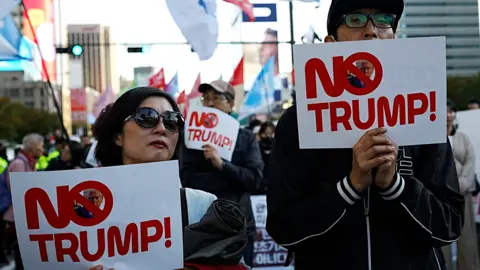 BBC
BBC“No Trump!” the rally of hundreds shouted, growing louder as it neared the United States embassy in the centre of South Korea’s capital Seoul.
A line of police buses stopped them reaching the gates, but a stage and loudspeaker ensured their voices would soar above Gwanghwamun square and within earshot of US President Donald Trump’s representatives.
This was a small rally by the standards of South Korea’s vibrant protest culture. And it was not the only one under way. A few hundred metres to the north, at the gates of Gyeongbokgung palace, marchers held aloft more banners as they chanted a very different message.
“No China,” along with a smattering of “CCP [Chinese Communist Party] out!”. Again, the numbers – several hundred people – were not huge for South Korea.
Nevertheless, this footfall through central Seoul on a sunny Saturday is an indication of the diplomatic dance South Korea’s President Lee Jae Myung will have to perform this week as he hosts the leaders of both the US and China.
Seoul is – and has long been – a key US ally. A friendship “forged in blood”, as its leaders often say, during the Korean War from 1950 to 1953, when American troops helped repel the North Korean invasion. The South still needs Washington’s protection, but it also needs China, its biggest trading partner and a vital market for exports.
“It’s a particularly fraught moment – South Korea finds itself caught between a rock and a hard place,” says Darcie Draudt-Vejares, from the Carnegie Endowment for International Peace.
“Year after year it is epitomising the choice of many countries worldwide that are deeply economically integrated with China, but also economically integrated with the US. Right now, Lee Jae-myung is trying to manoeuvre between these superpowers.”
So much so that his country is even hosting talks between Trump and Xi Jinping on Thursday that may well yield a breakthrough in their on-again-off-again trade war.
A lot on the line
At 61, Lee is a seasoned politician, but he has his work cut out for him.
His emphatic victory in June followed six months of turmoil. His predecessor Yoon Suk Yeol’s short-lived martial law order triggered huge protests and a constitutional crisis that eventually led to his impeachment, but left the country polarised.
By the time Lee took office, Trump’s tariffs had stunned both allies and rivals. Negotiations began and in August, Lee visited the White House and turned on the charm. It seemed to work.
South Korea thought it had appeased its powerful friend. Seoul said it would invest $350bn in the US and buy $100bn worth of liquified natural gas. In return, Trump agreed to lower tariffs from 25% to 15%.
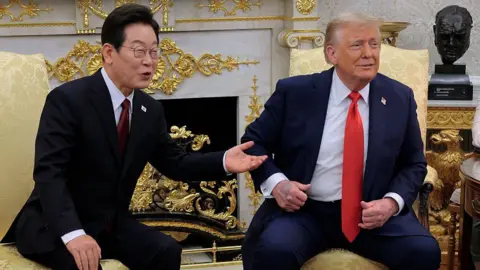 Getty Images
Getty ImagesBut then more than 300 South Koreans were detained in a massive immigration raid at a Hyundai plant in the US state of Georgia. Nearly all of them have since returned, but that has shaken ties – especially because Hyundai is a major investor in the US.
“I don’t think the relationship between the US and Korea is necessarily broken at this point,” said 23-year-old Hye-yeon Lee as the protest outside the US embassy came to an end.
“Although I do think it is being eroded significantly,” she added.
The White House has also increased its demands as part of the trade talks – Trump is now pushing for cash investments in the US. Despite attempts to get a deal signed, there is no final agreement and hopes of reaching one when the two leaders meet on Wednesday are not high.
“South Korea has a huge amount on the line in terms of their prosperity and their security with this visit, but in a funny way, the less time Donald Trump is here could be better for President Lee Jae-myung,” says John Delury, a senior fellow at the Asia Society’s Centre on US-China relations.
“It doesn’t look like they’re near a breakthrough on their trade agreement. And so, if Trump comes, has his meetings, they go well, and he’s out of here in 24 hours, that’s not a terrible outcome as far as South Korea is concerned.”
And there is clearly also anger and disillusionment, some of it driven by Trump’s contentious personal brand of politics. Hence the protests, where 22-year-old college student Kim Sol-yi was carrying a banner depicting a cartoon Trump vomiting money.
“When he called South Korea a ‘money machine’ that really angered me,” she said. “It seems the US is seeing and treating South Korea as its cash cow – plain and simple – asking for huge investments. Honestly, it makes me pretty mad and question whether the US even thinks of us as an equal partner.”
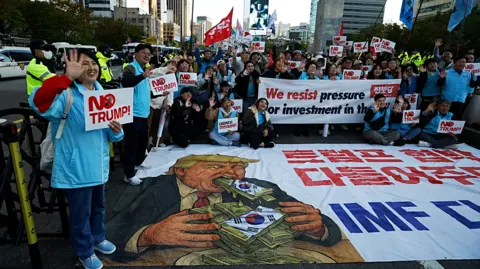
And yet South Koreans’ views of the US appear to be largely positive. Nearly nine out of 10 view the US as their most important ally, according to a poll taken earlier this year by the US-based Pew Research Centre. But the survey happened before the raids in Georgia.
That poll was not so favourable towards South Korea’s other superpower guest this week: China, whom a third of respondents viewed as their country’s biggest threat.
The China conundrum
“I came out here today out of love for South Korea, to protect South Korea,” said 27-year-old Park Da-som, who was at the other protest, rallying against China.
“I feel that the Republic of Korea is gradually being overtaken by Chinese influences,” she adds, but with a pragmatic caveat.
“Of course, I believe we should maintain a certain level of favourable diplomatic relations with China. What we dislike is the CCP – the Chinese Communist Party.”
Anti-Chinese sentiment in South Korea has grown steadily since 2016 when Seoul agreed to deploy an advanced US missile defence system in the country, which prompted economic retaliation from a furious Beijing. There are also historic grievances and theirs has always been an uneasy relationship.
But the mistrust has intensified on the right in a country divided by Yoon’s impeachment. Chinese interference became a common trope in conspiracy theories about Yoon being a victim of election fraud.
While tens of thousands demanded his removal from office, his supporters, far smaller in number but vociferous, opposed his impeachment – even now a fringe group of conservatives regularly call for his return. They are also the ones rallying against China.
“Korea for Koreans” read the banners at the weekend protests, along with signs calling on the government to “Stop the Chinese Boats”. One café is facing criticism after posting online that it would refuse to serve Chinese customers.
Such instances have led to allegations of racism but Soo-bin, 27, who was at the protests, disagreed: “We value democratic freedom and the free market economy. We want a Republic of Korea where all freedom – freedom of association, assembly, religion, expression – are protected. That is why we stand here.”
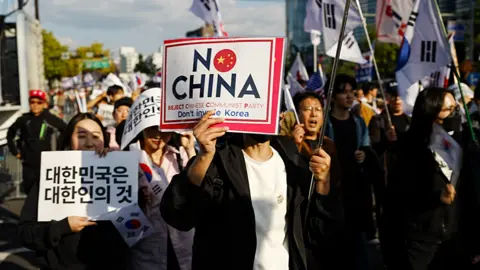
Observers say this is a minority view, represented by a small part of the Korean electorate. Yet it it’s hard to deny that there has been a small surge in anti-Chinese rhetoric recently after President Lee eased visa rules for Chinese tourist groups.
Lee has tried to curb the protests by introducing a bill banning rallies that promote hatred or discrimination. And long known for his openness to pursue stronger ties with China, he has made it clear that’s what he intends to do in office.
Xi Jinping is set to meet Lee one-on-one on Saturday during what is his first visit to South Korea in 11 years, despite it being a short hop from Beijing.
“If President Lee can deliver on the economic side, everyone will give him a pass, except for what is ultimately a pretty fringe position on what you could say is the far-right,” Mr Delury says. “President Lee is really governing more toward the centre, and the centre of Korea wants to get along with China.”
Hardball with superpowers
Xi arrives on Thursday and, after meeting Trump, he is spending three days in the ancient capital of Gyeongju with other leaders attending the APEC summit. He is spending more time in South Korea than Trump, which is a huge diplomatic opportunity as he seeks to present China as the more stable trading partner and global power.
A better relationship with Beijing – ties soured under Yoon, who was seen as hawkish towards China – could also help President Lee start a conversation with North Korea’s Kim Jong Un.
This is also a dialogue that he and his Democratic Party have pushed for – the earlier historic summits between Trump and Kim also happened with the help of a South Korean leader from the same party.
Could that happen this time? The US president has said he wants to talk, but there has been no reply from Pyongyang.
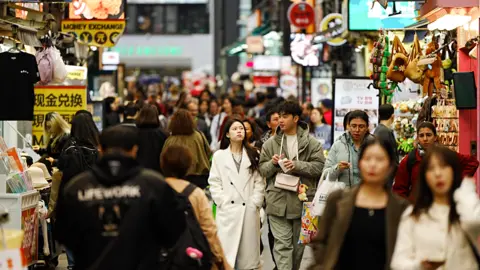
Kim aside, this is a big week for South Korea and Lee. It’s hard to miss America’s influence on the country, from music to religion, but South Korea is now a wealthy, soft-power giant with a voice of its own.
The streets bustle with westerners in traditional Korean Hanbok hunting for merchandise from the Netflix hit K-pop Demon Hunters or queuing in K-beauty shops for the hottest new face masks. The economy has been picking up speed again.
However Lee chooses to navigate between the world’s two biggest economies, it’s hard to imagine how he can afford to alienate either.



